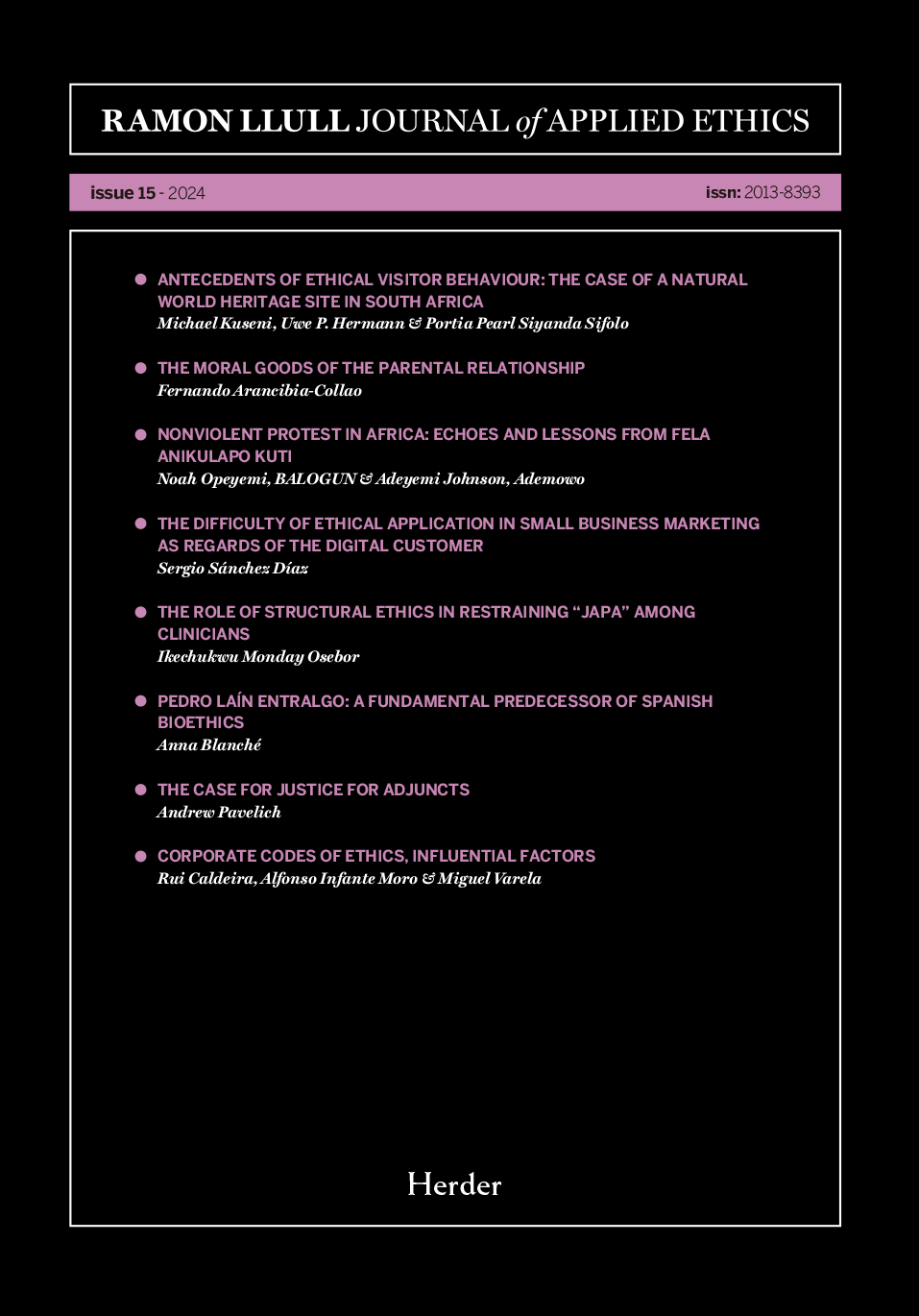The moral goods of the parental relationship
Article Sidebar

Main Article Content
In this article, I reflect on the moral goods involved in the parental relationship. In particular, I am interested in explaining the specific nature of the moral goods involved in the parental relationship. To do so, it is necessary, first of all, to make a distinction between the stages of development of the person. I argue that an explanation of the moral goods of this relationship must distinguish between the developmental stages of children and adults, proposing an explanation based on the moral goods proper to each stage. Second, I argue that moral philosophy has always had, as its focus, the goods of adults, their moral goods are those that identify the various ethical theories. However, in the explanation of the moral goods of childhood, a particular reflection is necessary. I examine the literature on the subject and systematize the findings of the various authors, together with my own position on this point. From an ethical point of view, I am interested in reflecting on how these goods are integrated in the context of the parental relationship. In the final part of the article, I argue that 1) the goods of the parents are the goods of the children and the way in which these are promoted; 2) the core of the parental relationship is gratuitousness, in a manner similar to friendship.
Article Details
Alstott A. (2004). No Exit. What Parents Owe Their Children and What Society Owes Parents. Oxford: Oxford University Press
Arancibia-Collao, F. & Martínez-Villavicencio, C. (2022). La relevancia moral de los lazos biológicos en la relación parental. Veritas, (51), 83-108. https://dx.doi.org/10.4067/S0718-92732022000100083
Archard, D. (1993). Children. Rights and Childhood. London: Routledge
Archard, D. (2003). “Children”, in LaFollete, H. (ed.) The Oxford Handbook of Practical Ethics. Oxford: Oxford University Press, pp. 91-111
Brennan, S. (2014). “The goods of Childhood and Children’s Rights”, in Baylis, F. y McLeod, C. (eds.) Family-making. Contemporary Ethical Challenges. Oxford: Oxford University Press, pp. 29-45
Brighouse, H. & Swift, A. (2014a). “The Goods of Parenting”, in Baylis, F. y McLeod, C. (eds.) Family-making. Contemporary Ethical Challenges. Oxford: Oxford University Press, pp. 11-28
Brighouse, H. & Swift, A. (2014b). Family Values. The Ethics of Parent-Child Relationships. Princeton: Princeton University Press
Buchanan, A. (2011). Beyond Humanity? Oxford: Oxford University Press
Callan, E. (1997). Creating Citizens. Political Education and Liberal Democracy. Oxford: Oxford University Press
Davison, S. (2011). On the Intrinsic Value of Everything. New York: Continuum
Divers, J. (2002). Possible Worlds. New York: Routledge
Finnis, J. (1980). Natural Law and Natural Rights. Oxford: Clarendon Press
Folbre, N. (1994). Who Pays for the Kids? Gender and the Structures of Constraint. London: Routledge
Giubilini, A. & Sanyal, S. (2016). “Challenging Human Enhancement”, in Clarke, S et al (ed.) The Ethics of Human Enhancement. Oxford: Oxford University Press, pp. 1-24
Habermas, J. (2003). The Future of Human Nature. Oxford: Polity
Kohlberg, L. (2011). De lo que es a lo que debe ser. Buenos Aires: Prometeo
Korsgaard, C. (1996). Creating the Kingdom of Ends. Cambridge: Cambridge University Press
Lemos, N. (1994). Intrinsic Value. Concept and Warrant. Cambridge: Cambridge University Press
Matthews, G. (1994). The Philosophy of Childhood. Cambridge: Harvard University Press
Millum, J. (2018). The Moral Foundations of Parenthood. Oxford: Oxford University Press
Nielsen, L. (2011). “The Concept of Nature and the Enhancement Technologies Debate”, in Savulescu, J. & ter Meulen & Kehane (eds.) Enhancing Human Capacities. Oxford: Wiley-Blackwell, pp. 19-33
Noddings, N. (2007). “Caring as Relation and Virtue in Teaching”, in Walker, R. & Ivanhoe, P. (eds.) Working Virtue. Oxford: Oxford University Press, pp. 41-60
Olson, E. (1997). The Human Animal. Oxford: Oxford University Press
Olson, E. (2007). What are We? Oxford: Oxford University Press
Orsi, F. (2015). Value Theory. London: Bloomsbury
Parfit, D. (1984). Reasons and Persons. Oxford: Oxford University Press
Pinsent, A. (2014). “Avarice and Liberality”, in Timpe, K. & Boyd, C. (eds.) Virtues and their Vices. Oxford: Oxford University Press, pp. 157-175
Reader, S. (2017). The Ethics of Choosing Children. New York: Palgrave MacMillan
Roberts, R. (2014) “Temperance”, in Timpe, K. & Boyd, C. (eds.) Virtues and their Vices. Oxford: Oxford University Press, pp. 93-111
Sandel, M. (2007). The Case Against Perfection. Cambridge: Harvard University Press
Wadell, P. (2014). “Charity: How Friendship with God Unfolds in Love for Others”, in Timpe, K. & Boyd, C. (eds.) Virtues and their Vices. Oxford: Oxford University Press, pp. 369-390
Waldfogel, J. (2006). What Children Need. Cambridge: Harvard University Press
Zimmerman, M. (2001). The Nature of Intrinsic Value. Boston: Rowman & Littlefield Publishers, Inc